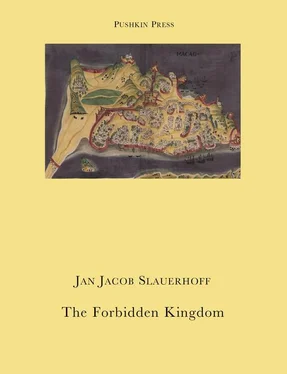A table had been laid for the two of them in the high-ceilinged, echoing dining room. Judith was not there. In reply to Luis’s question his father said that she was staying with her parents.
“So does that mean there’s another bastard on the way?”
He nodded, without looking up. They ate. Now and then the father asked about life at court, about an acquaintance, about the King, and then enquired hesitantly whether his poem had progressed. This was a sign for Luis to kick back his chair and burst into a flood of curses at the demon that still tormented and rendered him completely unfit for action.
“Why was I surrounded by statues since childhood, graceful and silent, as if that were the attitude one should take to life? Why so many paintings on the wall, so that it seemed to me that they were the windows, giving a view of a world where everything was beautiful and harmonious and near at hand, making it unnecessary to travel dangerous roads! If only you’d brought me up in the woods with an axe and double-edged hunting knife for my toys and the fleeing game as my target, then I’d have become efficient and decisive! As it is, I’ve done nothing but ponder and my deeds were badly aimed shots at a vaguely glimpsed reality.”
Luís drank a mouthful of wine, and old Camões surveyed him with silent sadness.
“I never forced you to write poems, though I was happy when I found them.”
“But you ambushed me with the Odyssey in the summerhouse! And I knew Homer was the blind man with a staff hanging in the entrance hall, I knew that he described distant journeys. That’s why I wanted to read it, and when I read it I was transported far away and wanted to try to achieve that myself, because I wasn’t yet allowed to travel. But it cheated my wanderlust and rocked me to sleep. Now I’m twenty and have never left Portugal.”
“Do you want to travel to Italy and Greece then?”
“No, never ever! If I do, I’ll be addicted for good.”
“Why do you want to leave? We have a large castle and extensive possessions. And the mountains are not far away. Why don’t you stay here and continue with your poetry? Do you think victories that eventually turn to defeats, commercial ventures that produce first profit, then loss are more illustrious? And all that travel will teach you nothing except that the earth is the same everywhere. Why not try to emulate Homer instead? Portugal will be forgotten and our name will live on.”
“What does it matter to me what happens to my name later? I’m living now and want the world! Anyway, I no longer have any choice. In a month’s time I must board ship. I’ve been exiled.”
“Exiled!” cried the old man. “Now I’ve only a year left to live? Don’t go! Hide here!”
“In six months’ time I’ll be in Goa. Now that I can’t have the woman I want, I want to forget everything, my homeland, my origins, but especially antiquity, poems and that woman.”
“Who is she? Tell me! You shall have her if I have to travel there myself.”
“Can you give me the woman who will shortly be Queen of Portugal? The King won’t survive his next stroke; the Infante will marry soon, since he is afraid she will be abducted.”
The father slumped back into his chair; Luís went into the garden.
He stayed a few more days. Little more was said; the father suffered, but no longer complained. When they parted he hung a reliquary round his son’s neck and tucked a book in his saddle bag. Luís returned to Lisbon on a narrow river barge, having chosen it so as to be the only passenger and not to have to share the deck with priests and merchants. Once the craft had rounded the bend, he tossed the reliquary into the river. He leafed through the book for a while. It was the first temptation of his youth; he hesitated, but finally let this souvenir too be carried away by the current.
I. Macao, in the year of Our Lord 15…
IT WAS THE HOTTEST MONTH of the year. The town lay motionless beneath the shimmering sky, in the courtyard the birds sat dazed in the hedges, the dead goldfishes floated on the pond and the leaves shrivelled and fell, as if it were autumn and still hot. The crickets made a commotion as if they were being grilled alive. In the office of the Procurador, the Attorney General, the wide fans hanging from the roof beams were moved faster and faster, without creating a cooling draught.
The Procurador was sitting at the table with his head in his hands. His doublet was hanging from his chair; he was constantly wiping his forehead, rendered higher by his receding hairline and beaded with sweat. He wasn’t working; he was waiting too expectantly for the message from the look-out tower that the Malacca fleet, on which they were relying for the necessary weapons, provisions and lamp oil, was finally arriving, already a month late.
To add to his irritation it had been decided that his old enemy Pedro Velho, the merchant who controlled the Japan trade, was to be installed as a senator in the next session. They were opposed to each other in everything. Campos wanted to continue to use force against the Chinese, Velho preferred to use intrigue and bribery. Velho wanted to secede from Malacca, which had too much control over his Japan trade. When reminded of Macao’s motto, Não Hà Outra Mais Leal (None More Loyal), he replied that if Macao immediately became a direct vassal of the King, that would be all the more true. He constantly pointed out that Malacca was more aware of its rights than its obligations with regard to Macao. Hence the late arrival of the fleet always pleased him. Actually Campos was hoping that the fleet had been delayed by storms or had been attacked and had not set sail late from Malacca, and then he would be able to shut Velho’s rebellious mouth.
There was a loud knock. Once more filled with hope, he called out for the visitor to enter, but saw at once that it was the weekly complaint of the mandarin of Huangshan. The attendant brought him the rolled parchment.
“Has the eye of the barbarians, by the Emperor’s decree under-mandarin of Sian-fu, yet again been unable to prevent two honourable merchants from Huangshan from being abused and imprisoned? We demand their release and compensation of a thousand taels.”
This was the purport of the flowery circumlocutions on the roll. Campos summoned the treasurer. “Pay the sum!” he ordered, sighing as he did so that these humiliations and extortion were undermining the law and emptying the coffers.
Semedo, the oldest subordinate official in Macao, was announced. Campos swiftly donned his doublet and received him, complaining about the fleet and the extortion. Semedo pointed through the window at the Ilha Verde, visible through the line of trees along the Praia.
“There is the answer. Properly cultivated, it can produce fruit, vegetables, table wine, cooking oil, everything, and then we won’t need Chinese usurers any more.”
“Don’t keep giving me the same old story!” cried Campos angrily. “I can’t teach soldiers to plant cabbages! And what Portuguese peasant is going to be induced to leave home to come and work on a Chinese island? If you can’t let go of the idea, then write a memorandum and then I’ll at least have a couple of years’ peace. And now don’t let anyone else in, except the messenger from Guia, should he arrive.”
As soon as Semedo had closed the door, he threw off his heavy doublet again and poured himself a drink of wine from a large earthenware jug that had retained some coolness. He sighed at a small pleasure amid these major afflictions. But again the door opened. “The messenger, at last!” He turned round. A tall, thin monk was standing in the middle of the room and stretching out an arm towards him.
Читать дальше












